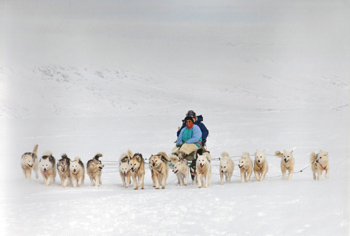From the Editor... Turning Dreams into Reality
In the News
Return of the Far Fur Country Project Update
Another Inuktitut Word for Snow
A Condo for Dogs: The Evolution of Our Dog Houses
Antiquity of the Inuit Sled Dog Supported by Recent Ancient DNA Studies
A Different Type of Sledding
Astrup’s Harness: A personal voyage to understand an old sealskin sled dog harness, Part 2
Movie Review: The Stories of Tuktu: Tuktu and His Eskimo Dogs
IMHO.... Why do we do this?
Navigating This Site
Index of articles by subject
Index of back issues by volume number
Search The Fan Hitch
Articles to download and print
Ordering Ken MacRury's Thesis
Our comprehensive list of resources
Defining the Inuit Dog
Talk to The Fan Hitch
The Fan Hitch home page
Editor: Sue Hamilton
Webmaster: Mark Hamilton
The Fan Hitch,
Journal of the Inuit Sled Dog, is
published four times a
year. It is available at no cost online
at: https://thefanhitch.org.
The Fan Hitch welcomes your letters, stories, comments and suggestions. The editorial staff reserves the right to edit submissions used for publication.
Contents of The Fan Hitch are protected by international copyright laws. No photo, drawing or text may be reproduced in any form without written consent. Webmasters please note: written consent is necessary before linking this site to yours! Please forward requests to Sue Hamilton, 55 Town Line Rd., Harwinton, Connecticut 06791, USA or mail@thefanhitch.org.
This site is dedicated to the Inuit Dog as well as related Inuit culture and traditions. It is also home to The Fan Hitch, Journal of the Inuit Sled Dog.
The Fan Hitch welcomes your letters, stories, comments and suggestions. The editorial staff reserves the right to edit submissions used for publication.
Contents of The Fan Hitch are protected by international copyright laws. No photo, drawing or text may be reproduced in any form without written consent. Webmasters please note: written consent is necessary before linking this site to yours! Please forward requests to Sue Hamilton, 55 Town Line Rd., Harwinton, Connecticut 06791, USA or mail@thefanhitch.org.
This site is dedicated to the Inuit Dog as well as related Inuit culture and traditions. It is also home to The Fan Hitch, Journal of the Inuit Sled Dog.
 Mark sits behind his Greenlander guide, Niels. Disko Bay region. Photo: Hamilton Why Do We Do This? |
We have far more complex social structures today than in the time of our forebears. Today when two strangers meet their initial interaction generally happens in an atmosphere of openness and pleasantry while they try to determine what and how much they have in common. I don’t for a moment believe our cave dwelling ancestors’ first reaction to unknown individuals was to offer a handshake and strive to determine just how good of a friend the other might become.
Today’s social conventions on meeting new people are mapped out in a way that presupposes commonality of interests and purposes. But that certainly is not always the case. People have unique interests, desires, likes, dislikes and goals, and two people with a common purpose can be responding based on two entirely different sets of motivations.
Personally, I don’t want, need or choose to return to the time when we carried a medium diameter section of tree limb around with us just so we were prepared when we met new people. On the other hand, time (and politicians) have taught me that just because someone says things I happen to agree with it doesn’t mean we have any significant commonality of purpose, or that we can develop a long lasting friendship or alliance.
Before that can happen I need to understand their motivations, why they said those things, exactly what they meant when they said them and where they see things going. Basically, I need to know a lot more about them. I don’t think I’m that different; you’d likely do the same thing.
So, that brings us back to that question at the top of the page, “Why do we do this?” How would I respond to that question?
We (Sue and I) do this (The Fan Hitch) because it’s something we can do, we enjoy the process and believe there is a need for the product (the site and the journal). We love the dogs, the place they came from and respect the culture with which the dogs are associated. The dogs are also a living connection between us and people we know, travels that we have taken and places we’ve been. We wish to see the dogs continue in their native environment, doing the work they’ve done for probably the last 4,000 years and we are trying to contribute to see that goal achieved.
Try it yourself. Why do we do this?